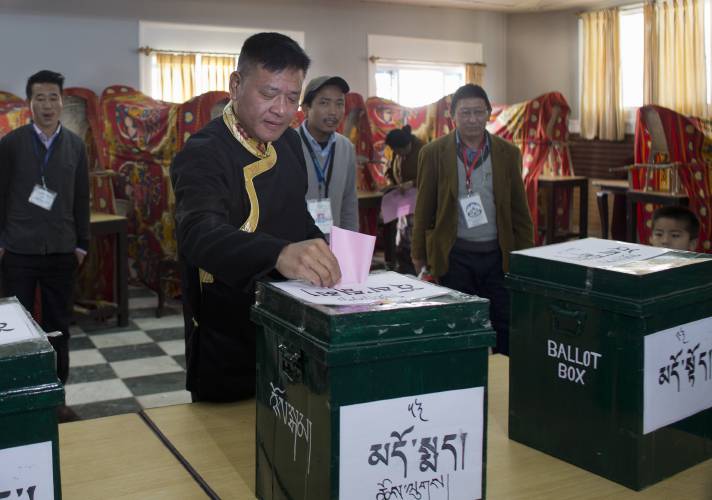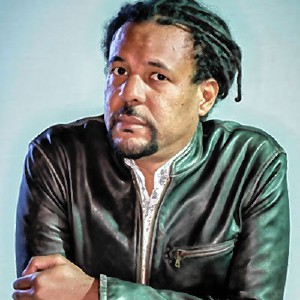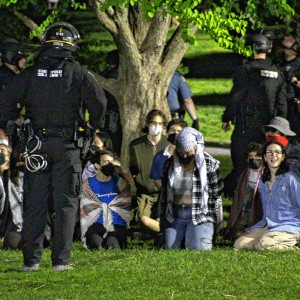Tibetan leader offers students window into ‘roof of the world’

Penpa Tsering, leader of the Tibetan government in exile, recently traveled to the University of Massachusetts. He’s pictured here in 2016. AP file
| Published: 11-06-2023 4:41 PM |
AMHERST — Penpa Tsering, leader of the Tibetan “government in exile,” recently traveled to the University of Massachusetts to discuss how China is attempting to eradicate Tibet’s unique cultural identity, urging listeners to be wary of “the dragon” — his nickname for the East Asian superpower.
Tsering is the elected political leader or “sikyong” of the Central Tibetan Administration in Dharamshala, India, representing more than 140,000 Tibetan people living outside of Tibet. He spoke with dozens of students, faculty and local residents last month in the Commonwealth Honors College Events Hall to raise awareness of the landlocked region and its quest for peaceful coexistence with China, not independence.
“There is no possibility for us to win,” Tsering said, describing a scenario in which Tibet could go to war with China to become a sovereign nation. “It’s not the question of who rules, it’s the question of the quality of who rules.”
Listeners rose from their seats when Tsering entered the room, accompanied by members of the local Tibetan community. He launched into a presentation on Tibet’s geography, describing the region as the “roof of the world,” “third pole” and “water tower of Asia” because of its high altitude and many glaciers. Tibet was not easy to invade because of the region’s unusual geography, Tsering said, illustrating his argument that Tibet was historically separate from China.
In the 1700s, the Qing dynasty of China assigned the Dalai Lama to take charge of Tibet, but ever since the 14th and current Dalai Lama relinquished his role in favor of creating an elected position like Tsering’s, the Chinese government has worked to assimilate Tibetans into Chinese culture, Tsering said.
“In terms of cultural genocide right now, we are talking about a million Tibetan children being put in colonial-style boarding schools where you are taught only Mandarin and you’re given only communist Chinese ideology,” Tsering said.
The sikyong went on to explain how once students return home from these schools, they can no longer speak their native tongue. He described this trend as “unfortunate” considering that while many countries are moving toward celebrating multiculturalism, “China is the only country that is moving towards uniculturalism.”
Limiting Russia’s international influence is a pressing issue for many in U.S. government, Tsering said, but keeping China in check should become one of their top priorities.
Article continues after...
Yesterday's Most Read Articles
 UMass graduation speaker Colson Whitehead pulls out over quashed campus protest
UMass graduation speaker Colson Whitehead pulls out over quashed campus protest
 ‘Knitting treasure’ of the Valley: Northampton Wools owner spreads passion for ancient pastime
‘Knitting treasure’ of the Valley: Northampton Wools owner spreads passion for ancient pastime
 More than 130 arrested at pro-Palestinian protest at UMass
More than 130 arrested at pro-Palestinian protest at UMass
 UMass student group declares no confidence in chancellor
UMass student group declares no confidence in chancellor
 South Hadley Town Meeting OK’s budget that lays off 24 school staff; nuisance bylaw tabled
South Hadley Town Meeting OK’s budget that lays off 24 school staff; nuisance bylaw tabled
 Host of road projects to begin Friday in Amherst
Host of road projects to begin Friday in Amherst
“Europe realizes that the immediate threat is Russia, but the long-term challenge is China,” Tsering said. “If you still want to feed the dragon, then whose fault is it?”
Tsering noted that a portion of Tibetans are resisting Chinese influence through acts of peaceful protest, some going as far as to perform “self-immolation” — the practice of lighting oneself on fire. One hundred fifty-nine Tibetans have self-immolated since 29, the International Campaign for Tibet reported.
Maintaining peace is a priority for Tibetans, said Thondup Tsering, one of two elected representatives to the CTA on behalf of the United States. Spreading awareness of this peaceful approach to foreign policy was one of the reasons Students for a Free Tibet — a group he advises which held the discussion with the sikyong — planned the event.
“Tibet offers a unique window of resolving conflict through non-violence,” Tsering said. “Violence as a means to resolve conflict is outdated. Tibet offers that solution.”
The sikyong ended his presentation on a hopeful note, echoing Tsering’s comments and encouraging listeners to set aside national divides and unite over what they share in common.
“As long as we understand the oneness of humanity, then this world will definitely be a better world to live in,” Tsering said.

 Area briefs: Hadley candidates forum slated for Monday
Area briefs: Hadley candidates forum slated for Monday Northampton school budget: Tensions high awaiting mayor’s move
Northampton school budget: Tensions high awaiting mayor’s move A rocky ride on Easthampton’s Union Street: Businesses struggling with overhaul look forward to end result
A rocky ride on Easthampton’s Union Street: Businesses struggling with overhaul look forward to end result  Valley lawmakers seek shorter license for FirstLight hydropower projects
Valley lawmakers seek shorter license for FirstLight hydropower projects
